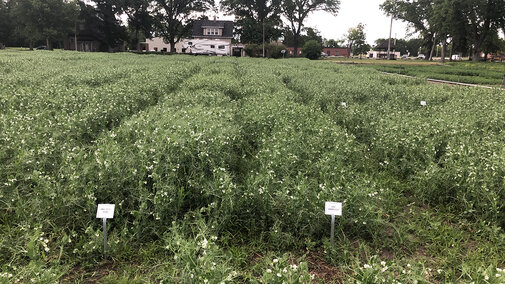Results of the 2019 variety trials for field peas have been posted to the Variety Trial section of CropWatch at https://cropwatch.unl.edu/varietytest/othercrops.
The pea trials consisted of five plots, each with 23 to 43 varieties. They were located in Cheyenne, Lincoln, Perkins (two plots), and Saunders counties. All plots were dryland except for one in Perkins, which was irrigated.
For each variety at each site, the data lists yield (according to rank), test weight, days to flowering and physiological maturity, height at harvest, moisture at harvest, and seed protein percentage. Each site report also has comments about the growing season and production practices at that location.
Results for 2019 and the two previous years are listed for dry beans and peas, along with oats, proso millet, and sunflower. Variety trial data for earlier years is archived on a separate page. Dry bean variety trial results are expected to be posted soon.
Alternative Crops Breeding Specialist Dipak Santra, who coordinated the project, noted that this year’s trial was below average because of adverse weather from the beginning of the planting season, which delayed planting. Crews began planting on April 5 and planted while the ground was wet, in some cases with snow cover. The desired planting window is the last week of March to April 4 or 5.
During the growing season, several weather events affected trial performance. In Perkins County, heavy rain caused partial flooding of plots. Sidney experienced a hailstorm and a tornado. A Box Butte County trial failed because the weather prevented the cooperating farmer from spraying a weed infestation. The remaining trial in the Panhandle, at the High Plains Ag Lab in Cheyenne County, was significantly below average. In the west central region, the Perkins County rainfed trial was significantly below average, but the irrigated trial was a little above average. The Lincoln County trial was above average. The rainfed trial in Saunders County was also average or slightly below average. There was no disease in any of the plots.
Historical/old varieties performed as they had in previous years, Santra said. High-yielding old varieties remained high-yielding. The top five high-yielding varieties in 2019 based on three dryland sites (Cheyenne, Perkins and Lincoln counties) were AAC Profit (No. 1 overall), D-Admiral (2), Spider (3), Durwood (4), and Bridger (5). The average yield among those five was 35 bushels per acre. Santra noted that this was driven by one site; the Lincoln County yield average was 60 bushels per acre. The 2019 average yield for Cheyenne County was 21 bushels per acre and Perkins County was 22 bushels per acre. The three-year average yield for the state is 33 bushels per acre.
Test weight averaged about 61 pounds per bushel, similar to the long-term average. There was no significant difference among the sites.
The 2019 average seed protein was about 25%, above the long-term average of 24%. There was no significant difference in seed protein among all the sites.
Last year two varieties, AAC Profit and Polancos, were among the top three varieties in yield. That same trend remained in 2019, except for Cheyenne County. AAC Profit ranked highest yielding at Lincoln County (81 bushels per acre). It ranked high at Perkins County (30 bushels per acre), but low in Cheyenne County (17 bushels per acre). Polancos yielded 79 bushels per acre in Lincoln County, 30 in Perkins County, and 17 at Cheyenne County. Both varieties were first tested in 2018.
Santra said one specific characteristic of AAC Profit is that it is high-yielding and at the same time high in seed protein, which is very uncommon among all the pea varieties tested. He noted that this is not the case with Polancos.
There were 11 new experimental lines entered in 2019 by three companies, Puris Foods (2), ProGene Plant Research (4), and Photosyntech (5). Two varieties from Photosyntech had high yields. One variety from Puris was high yielding, and none of the ProGene varieties yielded well, according to Santra.
Santra acknowledged assistance from UNL staff for each trial site: in Cheyenne County, UNL’s High Plains Ag Lab; in Perkins County, UNL’s Henry J. Stumpf Wheat Center; in Lincoln County, UNL West Central Research and Extension Center. Several of the locations hosted field days in June.
The data were compiled by Santra. The pea variety testing project is a collaborative program among several UNL specialists, educators, and staff. Santra recognized contributions from Cody Creech, dryland cropping systems specialist at the Panhandle REC; Jerry Volesky, range specialist from the West Central REC; Strahinja Stepanovic, cropping systems extension educator in Perkins, Chase and Dundy counties; Vernon Florke, research technician at the High Plains Ag Lab; Allison Rickey, research technician at the Panhandle REC; and Saurav Das, visiting scientist at the Panhandle REC.

